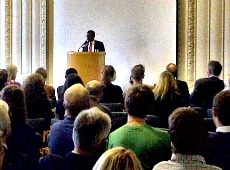Former President Maumoon Abdul Gayoom has called upon leaders of developed nations to allow small island states to lead the world in efforts to combat climate change.
“We say to the leaders of the emitting countries, if you are not ready to lead the world on climate change, then give us the opportunity,” Gayoom appealed in a statement delivered at the 3rd International Conference on Small Island Developing States (SIDS) in Apia, Samoa on Monday (September 1).
“SIDS are ready to lead. Don’t stand in our way.”
Despite challenges posed by the small size of SIDS, Gayoom said “size alone does not determine our destiny.”
“With the right policies and right choices we can become our own masters who will shape our future,” he said.
“To do that we need to establish partnerships; meaningful partnerships and enduring partnerships. Partnerships that are defined not by more aid, but by more opportunities. Opportunities that small states could seize to help themselves and to live their dreams.”
The former president is representing the Maldives at the four-day conference as a special envoy of President Abdulla Yameen along with Environment Minister Thoriq Ibrahim.
The objectives of the conference include “identifying new and emerging challenges and opportunities for the sustainable development of SIDS and means of addressing them” and “identifying priorities for the sustainable development of SIDS to be considered in the elaboration of the post-2015 UN development agenda.”
No progress
Despite “numerous pledges” at UN conferences where “ambitious action plans” were adopted, Gayoom noted that there was “very little to show in terms of real progress.”
“Global CO2 emissions continue unabated. Our fragile ecosystems face increasing threats. Sustainable and innovative solutions we initiate remain unrealised because of lack of international support,” he said.
“It is deeply disappointing to the Maldives, and to the people of all small island developing states to observe the lack of action, particularly by the industrialised economies.”
The objective of SIDS as a separate category was “to help small states in coping with vulnerability,” he added, as well as to coordinate policy decisions “instead of defining these states in terms of what they are not.”
Climate change should be the “core issue of concern” for both SIDS and the Alliance of Small Island States (AOSIS), Gayoom said.
While the Maldives was considered a beautiful and exotic tourist destination, Gayoom said the country was threatened by rising sea temperatures, unpredictable weather patterns, coral bleaching, increased salination of fresh water, accelerated beach erosion, and erratic migration of fish stocks.
The Maldives along with other SIDS have “consistently called for genuine action for climate change, to not bury it in the political manoeuvring that is a reality of today’s international diplomacy, to not wait until it is too late,” he said.
Despite vulnerability of small states, Gayoom said SIDS were also “valuable contributors in proposing common solutions to common problems.”
In the past four decades, the Maldives has shown that small states are both viable and “have extraordinary ability to survive and even thrive in the turbulent global political arena.”
He referred to the Maldives drawing international attention to sea level rise and security threats for small states in 1987.
Gayoom suggested that the declaration of the conference – the ‘Samoa Pathway’ – could “change the course of history in climate change and sustainable development negotiations.”
The declaration could help small states build resilience and develop economies driven by innovation and new technologies, he continued, which would “encourage free enterprise and individual initiative.”
Following today’s session of the conference, Gayoom tweeted,
I had the great privilege of chairing today 6th plenary session of 3rd UN Conference on SIDS in Samoa. pic.twitter.com/XxnXpXvGWf
— Maumoon Abdul Gayoom (@maumoonagayoom) September 3, 2014

